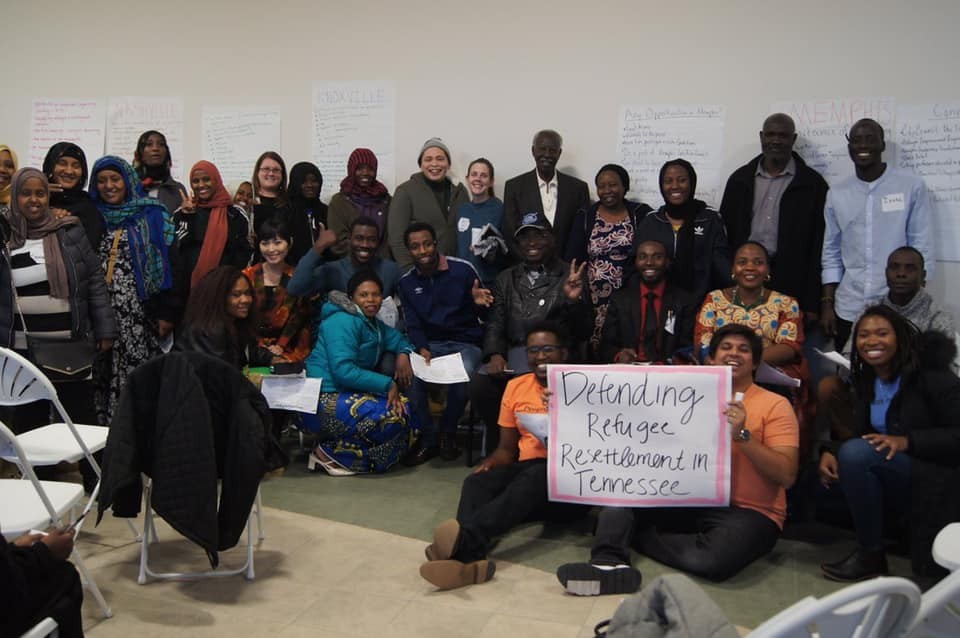 TIRRC/Facebook
TIRRC/Facebook
A recent TIRRC event supporting refugee resettlement
The Tennessee House of Representatives adopted a resolution late Monday condemning Tennessee Gov. Bill Lee’s decision to continue to welcome refugees in the state.
The resolution, HJR 0741, which is sponsored by Rep. Terri Weaver (R-Lancaster) and challenges Lee’s authority to authorize continued refugee resettlement, passed 75 to 25.
Representatives from Shelby County voting in favor of the resolution include Republicans Jim Coley, Tom Leatherwood, Kevin Vaughan, and Mark White.
Voting no from Shelby County were Democratic Representatives Karen Camper, Jesse Chism, Barbara Cooper, G.A. Hardaway, Larry Miller, Antonio Parkinson, Dwayne Thompson, and Joe Towns Jr.
Following President Donald Trump’s executive order in September that gave states the choice to opt in or out of continuing refugee resettlement, Lee announced the state’s consent to the program in December.
The resolution is “about Tennessee’s constitutional status as a sovereign state under the 10th Amendment on one hand and the separation of powers as established by our state constitution on the other hand,” Weaver said.
The resolution also seeks to advance Tennessee’s lawsuit against the federal government over refugee resettlement.
The lawsuit was filed in March 2017 against the United States Department of State on the grounds that refugee settlement in Tennessee violates the U.S. Constitution by requiring the state to pay for a program it did not consent to.
[pullquote-1]
The lawsuit was dismissed in March 2018 by a federal judge who ruled there was a lack of standing by the legislature to sue on its own behalf and that the state failed to show that refugee resettlement in Tennessee violates the Constitution.
The Sixth Circuit Court of Appeals upheld that decision in August, also stating that the General Assembly had not established its standing.
In September, attorneys with the Thomas Moore Law Center (TMLC), who are representing the state in the suit, filed a petition asking the appellate court to rehear the case, on the grounds that the court’s decision was “painfully at odds” with Supreme Court precedent. The court denied that request. Now, attorneys with TMLC are petitioning the U.S. Supreme Court to hear the case.

Weaver
Weaver, who was the House sponsor of the 2016 resolution that initiated the litigation, said the purpose of the resolution is to help the lawsuit move to the Supreme Court.
Lisa Sherman-Nikolaus, policy director for the Tennessee Immigrant and Refugee Rights Coalition (TIRRC), spoke out against the resolution, calling it “election year politics at its worst.”
“Representative Weaver’s resolution does nothing to alter or strengthen the resettlement program. Instead, it increases skepticism about refugees and re-hashes arguments that have already been settled by the courts and by the General Assembly,” Sherman-Nikolaus said. “There are many things legislators could do to support refugees and invest in the success of all families who call Tennessee home.
“This resolution accomplishes nothing except to spread misinformation, divide our communities, and make refugee families feel unwelcome. Representative Weaver should spend her time trying to pass legislation that meaningfully improves the lives of her constituents instead of scapegoating refugees.”
Wednesday (tomorrow) TIRRC is organizing a refugee “Day on the Hill” to oppose all anti-refugee legislation. More than 60 refugees from across the state are slated to gather at the TN Capitol building to meet with legislators and speak about their experiences as refugees and the importance of resettlement.
 World Relief
World Relief 